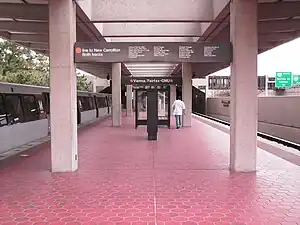Vienna station (Washington Metro)
Vienna station is a Washington Metro station on the Orange Line in Fairfax, Virginia. The station is in the median of Interstate 66 at Nutley Street, also known as Virginia State Route 243, in Fairfax.[1]
Vienna Fairfax–GMU | |||||||||||
|---|---|---|---|---|---|---|---|---|---|---|---|
 The Vienna station of the Washington Metro in Fairfax, Virginia | |||||||||||
| General information | |||||||||||
| Location | 9550 Saintsbury Drive[1] Fairfax, Virginia | ||||||||||
| Coordinates | 38.8776013°N 77.2722884°W | ||||||||||
| Owned by | Washington Metropolitan Area Transit Authority | ||||||||||
| Platforms | 1 island platform | ||||||||||
| Tracks | 2 | ||||||||||
| Connections |
| ||||||||||
| Construction | |||||||||||
| Structure type | Surface | ||||||||||
| Parking | 5,840 spaces | ||||||||||
| Bicycle facilities | Capital Bikeshare, 54 racks, 56 lockers | ||||||||||
| Accessible | Yes | ||||||||||
| Other information | |||||||||||
| Station code | K08 | ||||||||||
| History | |||||||||||
| Opened | June 7, 1986 | ||||||||||
| Rebuilt | 2020 | ||||||||||
| Previous names | Vienna (1986–1999) Vienna/Fairfax–GMU (1999–2011) | ||||||||||
| Passengers | |||||||||||
| 2022 | 2,231 daily[2] | ||||||||||
| Rank | 31st | ||||||||||
| Services | |||||||||||
| |||||||||||
| Location | |||||||||||
The station can be accessed from I-66 without merging onto Nutley Street by a series of ramps that transport commuters to the station's north and south side parking complexes. From the parking areas, riders use elevated walkways that bridge the east and westbound lanes of I-66 to reach the platform and mezzanine. The station provides easy access to the nearby Town of Vienna, the City of Fairfax, and the main campus of George Mason University. Service began on June 7, 1986.
Station layout
| G | Street level | Exit/entrance, buses, parking |
| P Platform level |
Eastbound | ← |
| Island platform | ||
| Eastbound | ← | |
History
Although originally identified as the western terminus of the Orange Line in the 1968 plan, by 1978, Fairfax County was debating whether the initial terminus should be at the Vienna location or at another location in Tysons.[3] After much public debate and public comment, the Fairfax County Board of Supervisors endorsed the Vienna routing. The endorsement was made after determining it would cost an additional $59 million and take another five years to complete the line to Tysons.[3] Metro service to Tysons Corner was later established as part of the Silver Line, which opened in 2014.
The groundbreaking for the station took place on September 8, 1982.[4] At the time, the final facility was to have cost $17.6 million with parking for 2,000 vehicles.[4] After nearly four years of construction, the station opened on June 7, 1986, as the western terminus of the Orange Line.[5] Its opening coincided with the completion of 9.1 miles (14.6 km) of rail from the Ballston–MU station and the opening of the East Falls Church, West Falls Church, and Dunn Loring stations.[5]
By 1993, officials in Fairfax City were looking to add "Fairfax" to the station name.[6] In March 1999, the station name was changed to Vienna/Fairfax–GMU,[7] which was misleading because a drive or ride on an infrequent CUE Bus or Metrobus is required to reach Fairfax City and GMU. In 2011, the Metro Board adopted guidelines limiting station names to nineteen characters. Stations with longer names were split in two: Vienna's "primary name" returned to Vienna and Fairfax–GMU became a "secondary name" on Metro maps.[8]
In May 2018, Metro announced an extensive renovation of platforms at twenty stations across the system. The platforms at the Vienna station would be rebuilt starting in mid-2020.[9]
From May 23 until September 7, 2020, this station was closed due to the platform reconstruction project, which closed stations west of Ballston–MU station.[10][11]
On June 3, 2023, this station was closed for track replacement, affecting stations west of Ballston-MU. Service resumed on July 17, 2023.[12]
Transit-oriented development
In line with high-density development, the Fairlee Metro-West project aims to increase the housing density around the Vienna station from 60 single-family homes to 2,250 condominiums and townhouses. This development has been controversial, as many Orange Line commuters believe the system will be pushed beyond capacity during rush hours.[13] As of May 2009, the project is under construction.[14]
References
- "Park and Ride - Vienna/Fairfax-GMU Metrorail Station". Fairfax County, Virginia. Retrieved June 30, 2023.
- "Rail Ridership Data Viewer". WMATA. Retrieved February 11, 2023.
- Locke, Maggie (April 25, 1978), "Fairfax Board Votes Metro Line for Vienna", The Washington Post, p. C1
- Hodge, Paul (September 15, 1981), "Ceremonies Mark Start Of Work At Metro's Orange Line Station In Vienna", The Washington Post, p. VA 1
- Lynton, Stephen J. (June 8, 1986), "9.1 More Miles For Metrorail", The Washington Post, p. C1
- Shear, Michael D. (August 26, 1993), "Angling To Get on Metro Map; Merrifield, Fairfax City Want Stations Renamed", The Washington Post, p. V1
- Reid, Alice (May 5, 1999), "All Aboard on Station Names", The Washington Post, p. B1
- "Station names updated for new map" (Press release). Washington Metropolitan Area Transit Authority. November 3, 2011. Archived from the original on February 12, 2018. Retrieved November 5, 2011.
- "Metro wants to rebuild 20 station platforms over three years, creating SafeTrack-like disruptions". Washington Post. May 7, 2018. Retrieved February 19, 2019.
- "Metro to use upcoming low-ridership summer to maximum effect, expands Orange, Silver line shutdown". www.wmata.com. Retrieved April 23, 2020.
- "Platform Improvement Project | WMATA". www.wmata.com. Retrieved May 24, 2020.
- https://www.nbcwashington.com/news/local/vienna-and-dun-loring-orange-line-stations-reopen-after-months-of-track-work/3385807/#:~:text=The%20Vienna%20and%20Dunn%20Loring%20Metro%20stations%20reopened%20Monday%20after,and%20added%20fiber%2Doptic%20cables.
- Shaffer, Ron (February 27, 2006). "Live Discussion with Post columnist Robert Thomson". The Washington Post. Retrieved November 11, 2014.
- Gardner, Amy (May 21, 2009), "For More Riders, 'the Bus Is Beautiful'", The Washington Post, pp. V1